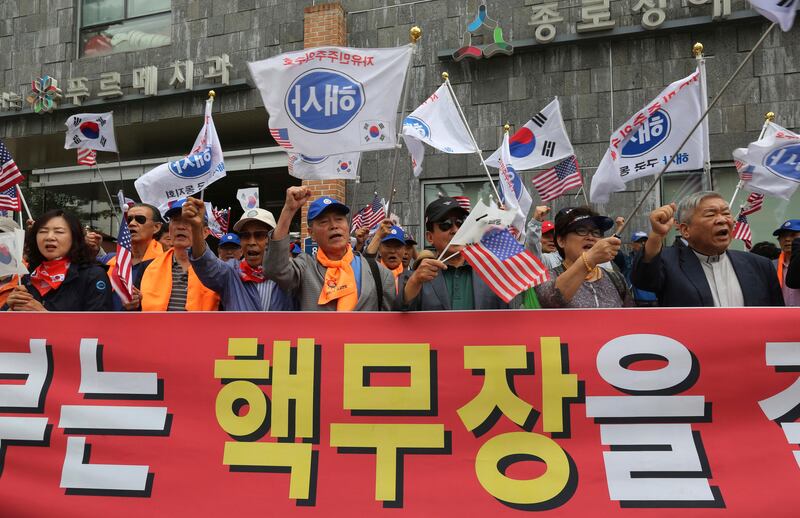The US and South Korea have vowed to work more closely to defend against the "grave threat" of North Korea, the allies said in a joint statement on Tuesday.
"North Korea’s dangerous and destabilising pursuit of nuclear-armed ballistic missiles represents a threat to all nations in the region and beyond. These actions will not alter the ironclad commitment of the United States and the Republic of Korea (ROK) alliance to defend the ROK," it said.
"North Korea’s recent provocations and belligerent rhetoric only drives the United States and the ROK to work more closely to defend against and counter this grave threat."
The statement came after Kim Jong-un's regime on Sunday detonated what it described as a hydrogen bomb designed for a long-range missile, sparking global alarm with what was by far its most powerful test to date.
Earlier, US president Donald Trump tweeted: "I am allowing Japan & South Korea to buy a substantially increased amount of highly sophisticated military equipment from the United States".
On Monday, the South's military launched a volley of ballistic missiles simulating an attack on the North's nuclear test site.
Mr Trump did not elaborate on the kind of weaponry and equipment he had in mind, but the White House has said the president is willing to approve the sale of "many billions of dollars' worth of military weapons and equipment" to Seoul.
The White House also confirmed an earlier announcement by Seoul that the US would lift restrictions on South Korean missile payload capabilities.
Seoul was previously restricted to a maximum warhead weight of 500 kilograms on its ballistic missiles, according to a bilateral agreement with the US signed in 2001.
Washington on Monday launched a bid at the UN Security Council to quickly slap the "strongest possible measures" on North Korea in response to its sixth and most powerful nuclear test, but China and Russia argued that diplomatic talks were needed to address the crisis.
Mr Putin has called for talks with North Korea, warning against "military hysteria". During a news conference in China on Tuesday, he criticised sanctions as “useless and ineffective”, instead urging the international community to offer security guarantees to North Korea.
“They’ll eat grass, but they won’t abandon their program unless they feel secure,” he said at an emerging markets summit on Tuesday in Xiamen, China, which was hosted by his Chinese counterpart Xi Jinping.
"Whipping up military hysteria makes absolutely no sense in this situation," Mr Putin said. "This is a road to nowhere."
Russia earlier condemned North Korea's latest nuclear test as "provocative," but said it does not support the idea of slapping North Korea with more sanctions.
US Ambassador to the United Nations Nikki Haley said on Monday the Trump administration would seek the strongest possible sanctions against Mr Kim’s regime.
Mr Kim was “begging for war” after testing what he claimed was a hydrogen bomb, she said after a meeting of the UN Security Council. She said the US would circulate new draft sanctions and wants the Security Council to vote on them September 11.
Japan is singing the same tune as the US, with deputy prime minister Taro Aso on Tuesday calling for additional measures. “There’s no chance of talks progressing without increasing pressure,” he said.
German Chancellor Angela Merkel has also condemned North Korea's latest nuclear test as a "flagrant violation" of international conventions.
She told told the German parliament on Tuesday there can only be a "diplomatic and peaceful solution" of the crisis, and that North Korea's distance from Germany should not keep the country from helping to end the crisis.
South Korean president Moon Jae-in took office four months ago promising a new era of engagement with North Korea. But now, he is pushing for a military overhaul to keep Mr Kim’s regime at bay.
In the past few weeks, Mr Moon has sought stronger warheads on ballistic missiles, stepped up military drills, discussed the deployment of US strategic bombers to South Korea and embraced a missile defence system he once questioned.
He has also called on his generals to draw up a detailed timetable to complete a last-resort strategy to strike North Korean nuclear sites, intercept missiles and take out its leadership.
Mr Moon, whose May election win ended nine years of conservative rule, has had little choice but to shift focus after Mr Kim tested two intercontinental ballistic missiles, fired a rocket over Japan and detonated North Korea’s most powerful nuclear device yet.
Mr Kim has shunned overtures from Mr Moon, saying he would never negotiate away his nuclear weapons if the US maintains its hostile policy.
“Moon is showing that he’s pragmatic,” said John Blaxland, head of the Australian National University’s Strategic and Defence Studies Centre in Canberra. “The circumstances are more dire than he faced when he took office. He isn’t as doggedly ideologically left as some might have anticipated.”
Still, for Mr Trump, Mr Moon hasn’t gone far enough. Tensions between the leaders surfaced recently, when the South Korean president asserted a right to veto any US strike against North Korea.
After the North Korean regime detonated what it called a hydrogen bomb on Sunday, Mr Trump dismissed Mr Moon’s approach as “appeasement”. A day earlier, Mr Trump reportedly threatened to kill a US-South Korea free trade agreement.
* Agence France-Presse, Associated Press and Bloomberg





